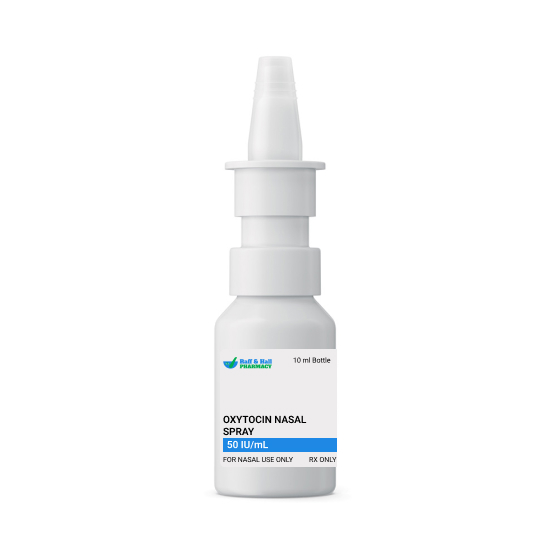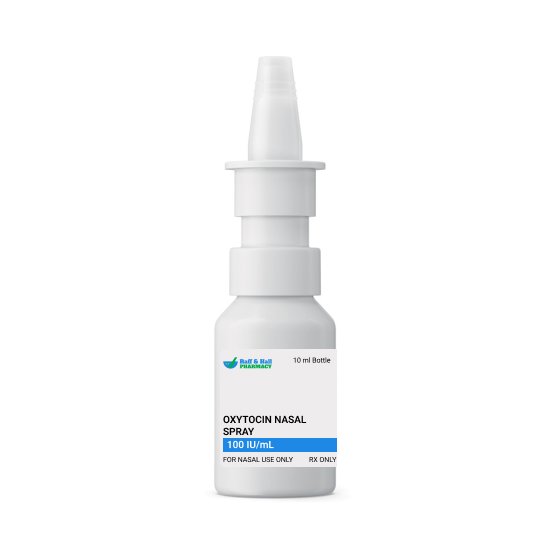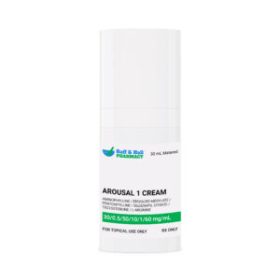This product is available solely through our 503A Compounding Pharmacy, ensuring personalized care and precision in every order. Please note that a valid prescription is required for purchase. If you do not have an account, please contact us.
Oxytocin Nasal Spray (10 mL)
Oxytocin Nasal Spray is a prescription medication that delivers oxytocin through the nasal passages. It is used for specific medical purposes such as supporting labor, assisting with breastfeeding, or in some cases, being investigated for its effects on social behavior and emotional bonding. The spray format allows for rapid absorption, making it useful in situations where quick action is needed. It should only be used under the guidance of a healthcare professional.
When administered through the nasal spray, oxytocin is absorbed into the bloodstream and crosses into areas of the brain where it influences behavior and emotional responses. In the uterus, oxytocin promotes contractions that aid labor and delivery. In the mammary glands, it stimulates the muscles around the milk ducts, facilitating milk release. Additionally, oxytocin affects brain regions involved in trust, empathy, and social interactions, which is why it is being explored for psychological and emotional applications.
Oxytocin Nasal Spray should not be used by individuals with uterine complications such as placenta previa, previous uterine surgery, or conditions that make vaginal delivery unsafe. It should also be avoided by people with heart disease, uncontrolled high blood pressure, or hypersensitivity to oxytocin. Care must be taken to use it only as prescribed, and patients should inform their doctor about any ongoing medical conditions, including mental health disorders or hormonal imbalances. Monitoring during use is essential to prevent excessive uterine contractions or other adverse effects.
This nasal spray may interact with other medications that affect the uterus, blood pressure, or mood. Combining it with labor-inducing drugs like prostaglandins or ergometrine can amplify uterine contractions and pose risks. Certain antidepressants or antipsychotics may also influence the effects of oxytocin on mood and behavior. Alcohol and recreational drugs should be avoided while using this treatment, as they may interfere with its action or increase side effects. Always consult a healthcare provider before combining this spray with other therapies.
Some users may experience nasal irritation, headache, or dizziness after using the spray. Others may report nausea, fatigue, or increased blood pressure. In rare cases, excessive uterine contractions, allergic reactions, or difficulty breathing may occur. Emotional changes such as mood swings, anxiety, or irritability have also been noted. If severe symptoms such as chest pain, swelling, or breathing difficulties appear, medical attention should be sought immediately.
During pregnancy, oxytocin is naturally present and plays a crucial role in preparing the body for childbirth. However, synthetic oxytocin, especially through a nasal spray, should be used cautiously and only when medically necessary. Its use is generally restricted to closely monitored situations. For breastfeeding mothers, the spray may support milk release, but it should not be used without a doctor’s advice, as improper dosing could lead to side effects for both the mother and the baby.
Store this medication in a refrigerator between 36°F to 46°F (2°C – 8°C). Do not freeze. Protect from light. Keep all medicine out of the reach of children. Throw away any medicine after the beyond use date. Do not flush unused medications or pour down a sink or drain.
- Cabanac M, Pfaff DW, Ogawa S, et al. Neural oxytocinergic systems as genomic targets for hormones and as modulators of hormone-dependent behaviors. Results Probl Cell Differ 1999;26:91-105.
- Modahl C, Green L, Fein D, et al. Plasma oxytocin levels in autistic children. Biol Psychiatry 1998;43:270-277.
- American College of Obstetrics and Gynecology (ACOG). ACOG Practice Bulletin Number 10: Clinical Management Guidelines for Obstetrician-Gynecologists. Induction of labor. Washington, DC: American College of Obstetricians and Gynecologists; November 1999.
- Mangesi L, Dowswell T. Treatments for breast engorgement during lactation. Cochrane Database Syst Rev. 2010;9:CD006946.
- Cervidil® (dinoprostone vaginal insert) package insert. St. Louis, MO: Forest Laboratories, Inc.; 1997 Jul.
- Pitocin® (oxytocin injection, USP) package insert. Rochester, MI: Monarch Pharmaceuticals; 2003 Jan.
- Halothane, USP package insert. North Chicago, IL: Abbott Laboratories; 1998 Mar.
- Pitocin (oxytocin) package insert. Rochester, MI: JHP Pharmaceuticals, LLC; 2014 Sept.
- Curless RV, Beaumont DM, Sinar EJ, et al. Subarachnoid hemorrhage mimicking acute water intoxication during labour augmented by oxytocin infusion. Br J Clin Pract 1990;44(12):637-638.






